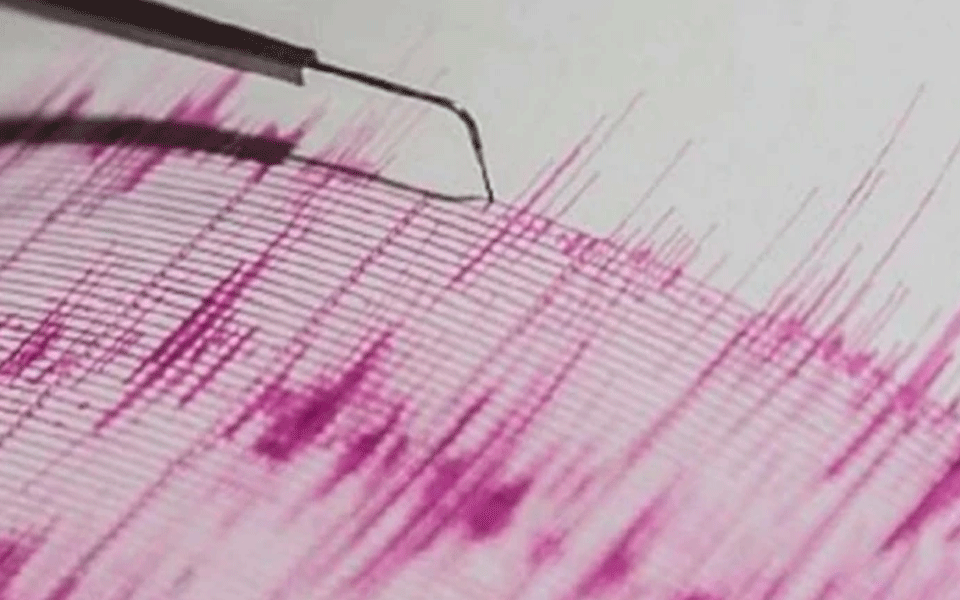Jakarta (AP): An earthquake shook Indonesia's main island of Java on Monday, killing at least 46 people, damaging dozens of buildings and sending residents into the capital's streets for safety.
The U.S. Geological Survey said the magnitude 5.6 quake was centered in the Cianjur region in West Java province at a depth of 10 kilometers (6.2 miles).
"There are 46 dead people at the Cianjur regional hospital and around 700 injured people. Many were hurt because they were hit by collapsed buildings," National Disaster Mitigation Agency chief Suharyanto said.
Several landslides were reported around Cianjur. Dozens of buildings were damaged, including an Islamic boarding school, a hospital and other public facilities, the agency said.
Information was still being collected about the extent of casualties and damage, it said in a statement.
The quake was felt strongly in the greater Jakarta area. High rises in the capital swayed and some were evacuated.
"The quake felt so strong. My colleagues and I decided to get out of our office on the ninth floor using the emergency stairs," said Vidi Primadhania, an employee in South Jakarta.
Earthquakes occur frequently across the sprawling archipelago nation, but it is uncommon for them to be felt in Jakarta.
The country of more than 270 million people is frequently struck by earthquakes, volcanic eruptions and tsunamis because of its location on the "Ring of Fire," an arc of volcanoes and fault lines in the Pacific Basin.
In February, a magnitude 6.2 earthquake killed at least 25 people and injured more than 460 in West Sumatra province. In January 2021, a magnitude 6.2 earthquake killed more than 100 people and injured nearly 6,500 in West Sulawesi province.
A powerful Indian Ocean quake and tsunami in 2004 killed nearly 230,000 people in a dozen countries, most of them in Indonesia.
#Indonesia #Earthquake: Nearly 20 dead, 300 injured#Earthquake #WestJava #Java pic.twitter.com/03VJHv4RZg
— Himanshu dixit 💙 (@HimanshuDixitt) November 21, 2022
BREAKING: #BNNIndonesia Reports
— Gurbaksh Singh Chahal (@gchahal) November 21, 2022
According to local officials, "nearly 20 people were killed and 300 were injured" in #Indonesia's #WestJava 5.6 magnitude #earthquake. pic.twitter.com/jFlNLVssVb
#BREAKING #BreakingNews
— Top Disaster (@Top_Disaster) November 21, 2022
Another video #Indonesia 🇮🇩 Widespread damage and chaos in #Cianjur from 5.6 Magnitude #earthquake in West #Java.
Two people died and four injure.
TELEGRAM JOIN 👉 https://t.co/anmxTr9HCh pic.twitter.com/LU8SOiBJaa
Let the Truth be known. If you read VB and like VB, please be a VB Supporter and Help us deliver the Truth to one and all.
Ullal: The body of a 51-year-old physical education teacher was found in a well at his residence in Kondana, under the limits of Kotekar town, on Friday evening.
The deceased has been identified as Prabhakar Jogi, who was serving as a physical education teacher at the Government School in Kallarakodi, Naringana village. Police suspect that he may have died by suicide, allegedly due to health-related issues.
According to police, Prabhakar had dropped his daughter at Uchila School earlier in the day for the school anniversary programme and returned home.
He was later preparing to attend the same event along with his wife and son, when he suddenly went missing. A search was launched by family members, following which his body was found in the well located at his house.
ALSO READ: Delhi: Married man stabs lover after fight over forced abortion, arrested
Police said that Prabhakar Jogi was reportedly suffering from a neurological disorder. He had served in several schools across Ullal taluk and was actively involved in organisations of physical education teachers.
Ullal police visited the spot, conducted an inspection and sent the body for post-mortem examination.
In his complaint to the police, Prabhakar’s son, Sai Tejas, stated that his father had jumped into the well and that there was no suspicion surrounding the death.
Based on the complaint, a case has been registered and further investigation is underway.





